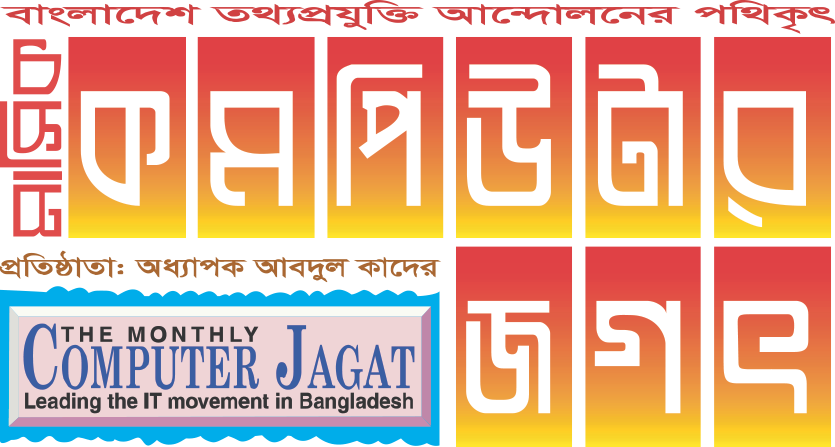হোম >
লেখক পরিচিতি
লেখকের নাম:
লুনা শামসুদ্দোহা
মোট লেখা:৩
লেখা সম্পর্কিত
পাবলিশ:
২০১৭ - এপ্রিল
তথ্যসূত্র:
কমপিউটার জগৎ
লেখার ধরণ:
আইসিটি
তথ্যসূত্র:
ইংরেজি সেকশন
ভাষা:
ইংরেজি
স্বত্ত্ব:
কমপিউটার জগৎ
Changing work: Positioning Skills for A Digital Economy
Luna Shamsuddoha
Chairman, Dohatec New Media
President, Bangladesh Women in Technology
The world of work is undergoing a major process of change. There are several forces transforming it from the onward march of technology and the impact of climate change to the changing character of production and employment. International Labour Organization (ILO) Director-General Guy Ryder has launched a “Future of Work initiative to “look at the longer term drivers of change, the transformational mega-trends, and what they imply for the goals we pursue in the ILO in its second century.”
Economists too predict further job losses as Artificial Intelligence, robotics, and other technologies continue and not a pro-job growth future. An Oxford study found that the developed nations will see job loss rates of up to 47% within the next 25 years for both blue and white collar jobs. The concept of employment is about to change in a dramatic fashion. There have been calls to corporations, academia, government, and nonprofits to cooperate to modernize our workforce.
So what skills are necessary for the digital economy?
Increasing use of digital technologies at work is raising the demand for new skills along three lines:
* workers across a range of occupations need to acquire generic ICT skills to be able to use technologies in their daily work.
* the production of ICT products and services – software, web pages, e-commerce, cloud and big data – requires ICT specialist skills to programme, develop applications and manage networks.
* the use of ICTs is changing the way work carried out and raising the demand for ICT-complementary skills, e.g.: the capability to process complex information, communicate with co-workers and clients, solve problems, plan in advance and adjust quickly.
* Lastly, attainment of sound levels of foundation skills constitutes a prerequisite for the proficient development of ICT generic, specific and complementary skills.
Many workers use ICTs regularly without adequate ICT skills: on average, over 40% of workers using office software every day apparently do not have sufficient skills to use them effectively.
ICT complementary skills
The diffusion/distribution of ICT at the workplace is not only raising the demand for ICT specialist and generic skills. It is also changing the way work is carried out and raising the demand for ICT complementary skills. These are skills that are not related to the capability to use the technology effectively but to carry out the work within the new environment shaped by ICTs, i.e.: a ‘technology-rich environment’.
Wider distribution of information among a larger number of workers increases the importance of management and coordination. The sales skills required in face-to face commercial transaction are not the same as those involved in an anonymous e-commerce sale.
The changing nature of work
Developing skills policies based on trends in task demands has its own risks due to rapid tasks and skills obsolescence. The insights of the educational research community on the definition and development of 21st century skills are important to bridge the gap between a task-based approach and good practice examples. The educational research community has pointed out the profound transformation from industrial to knowledge-based economies and societies, whereby knowledge becomes central and needs to be continuously regenerated by learning. Workers in the digital economy should be able to generate and process complex information; think systematically and critically; take decisions weighing different forms of evidence; ask meaningful questions about different subjects; be adaptable and flexible to new information; be creative; and be able to create a demand for new skills (National Research Council).
Next to cognitive skills children should be able to develop social and emotional skills, which are referred to as ‘soft skills’. Social and emotional skills include working with others, managing emotions and achieving goals.
To stay relevant, companies should consider how their talent requirements need to be evolved, to meet the skills and workforce challenges created by rapid digitalization.
Companies have to be a great place to work for Millennials. Formulate a multiyear engagement strategy. Empower and incentivize the workforce through development opportunities.
Create a workforce with digital skills. Whether it’s developing training programs to obtain necessary skills or hiring digital natives, companies need to be aware of where talent is headed and how they can help.
Bring leadership into the digital age
Leaders should hire people with digital mindsets and a willingness to change the status quo. Accept failure, and move away from the risk-averse mindset. Finally, embrace flatter structures and move away from hierarchies.
Foster a digital culture from the top through communication, journey
management, visible changes, and continuous change monitoring.
Evaluate the value of automation, establish the extent to which automation will form the core of business, and invest in developing internal automation capabilities.
Create environments where humans and robots can work together successfully. Currently, 81% say they are looking for a wider mix of skills when hiring 73% of CEOs cite skills shortages as a there are three threat to their businesses.
Societal Implications : Three Major Impacts of Digital Transformation
Employment : Current estimates of global job losses due to digitalization range widely, from 2 million to as high as 2 billion by 2030. This analysis suggests that digitalization can be a net job creator in some industries. But, with both winners and losers resulting from digital transformation, a huge premium rests on the near-term ability of businesses to up skill employees and shape the next generation of talent.
Sustainability : Current business practices will contribute to a global gap of 8 billion metric tons between the supply of and demand for natural resources by 2030, translating to $4.5 trillion of lost economic growth. The analysis suggests that digitalization could make a positive contribution to this challenge. It has not yet been possible to decouple economic growth from an increase in emissions and use of resources.
Trust : Social media, user-generated websites and other innovations have been instrumental in increasing transparency and overcoming information asymmetries. However, trust in all technology-based sectors declined in 2015. Beyond privacy and security concerns, broader ethical questions about the way organizations use digital technology threaten to erode trust in those institutions.
Disruptive Technologies
Based on their widespread application, resulting efficiencies and impact on labour, AI /machine learning, autonomous vehicles / drones, IoT and robotics will be the four most transformational technologies to the industry.
Transformative Business Models
e-commerce could reach penetration rates of more than 40% in 2026, which will drive $600 billion in value for business.
Four key business models will proliferate: Sharing Economy, Smart Replenishment, Curated Subscription, and Do It for Me. Sharing Economy will drive the highest value at stake, with $1.7 trillion of value for society.
Empowered Consumers
The consumer equation of Cost + Choice + Convenience is becoming more complex due to the additional dimensions of Control + Experience.
Incumbents must open up their value chain to consumers, enabling them to participate and control a greater span of their experience.
Key Capabilities
Intra- and extra-industry partnerships will be critical for developing ecosystems to remain competitive in the future.
Last-mile delivery infrastructure currently comprises 25% of the total cost of delivery and must become more efficient.
Societal Impacts
Public-private partnerships will be critical for managing the impacts on the workforce, the environment and local communities.
In conclusion Bangladesh officials will need to be familiar to the changing nature of jobs and be charged with addressing:
How women can be skilled for the emerging jobs.
How to create the jobs that the changed world will require.
Provide support in the entrepreneurial space.
New school curriculums have to be made and licenses for technologies made available.
Finally the benefits of technology in improvement of the life of the Bangladesh citizen has to be realized and productive engagement of women in work cannot for a moment be lost sight of
Chairman, Dohatec New Media
President, Bangladesh Women in Technology
The world of work is undergoing a major process of change. There are several forces transforming it from the onward march of technology and the impact of climate change to the changing character of production and employment. International Labour Organization (ILO) Director-General Guy Ryder has launched a “Future of Work initiative to “look at the longer term drivers of change, the transformational mega-trends, and what they imply for the goals we pursue in the ILO in its second century.”
Economists too predict further job losses as Artificial Intelligence, robotics, and other technologies continue and not a pro-job growth future. An Oxford study found that the developed nations will see job loss rates of up to 47% within the next 25 years for both blue and white collar jobs. The concept of employment is about to change in a dramatic fashion. There have been calls to corporations, academia, government, and nonprofits to cooperate to modernize our workforce.
So what skills are necessary for the digital economy?
Increasing use of digital technologies at work is raising the demand for new skills along three lines:
* workers across a range of occupations need to acquire generic ICT skills to be able to use technologies in their daily work.
* the production of ICT products and services – software, web pages, e-commerce, cloud and big data – requires ICT specialist skills to programme, develop applications and manage networks.
* the use of ICTs is changing the way work carried out and raising the demand for ICT-complementary skills, e.g.: the capability to process complex information, communicate with co-workers and clients, solve problems, plan in advance and adjust quickly.
* Lastly, attainment of sound levels of foundation skills constitutes a prerequisite for the proficient development of ICT generic, specific and complementary skills.
Many workers use ICTs regularly without adequate ICT skills: on average, over 40% of workers using office software every day apparently do not have sufficient skills to use them effectively.
ICT complementary skills
The diffusion/distribution of ICT at the workplace is not only raising the demand for ICT specialist and generic skills. It is also changing the way work is carried out and raising the demand for ICT complementary skills. These are skills that are not related to the capability to use the technology effectively but to carry out the work within the new environment shaped by ICTs, i.e.: a ‘technology-rich environment’.
Wider distribution of information among a larger number of workers increases the importance of management and coordination. The sales skills required in face-to face commercial transaction are not the same as those involved in an anonymous e-commerce sale.
The changing nature of work
Developing skills policies based on trends in task demands has its own risks due to rapid tasks and skills obsolescence. The insights of the educational research community on the definition and development of 21st century skills are important to bridge the gap between a task-based approach and good practice examples. The educational research community has pointed out the profound transformation from industrial to knowledge-based economies and societies, whereby knowledge becomes central and needs to be continuously regenerated by learning. Workers in the digital economy should be able to generate and process complex information; think systematically and critically; take decisions weighing different forms of evidence; ask meaningful questions about different subjects; be adaptable and flexible to new information; be creative; and be able to create a demand for new skills (National Research Council).
Next to cognitive skills children should be able to develop social and emotional skills, which are referred to as ‘soft skills’. Social and emotional skills include working with others, managing emotions and achieving goals.
To stay relevant, companies should consider how their talent requirements need to be evolved, to meet the skills and workforce challenges created by rapid digitalization.
Companies have to be a great place to work for Millennials. Formulate a multiyear engagement strategy. Empower and incentivize the workforce through development opportunities.
Create a workforce with digital skills. Whether it’s developing training programs to obtain necessary skills or hiring digital natives, companies need to be aware of where talent is headed and how they can help.
Bring leadership into the digital age
Leaders should hire people with digital mindsets and a willingness to change the status quo. Accept failure, and move away from the risk-averse mindset. Finally, embrace flatter structures and move away from hierarchies.
Foster a digital culture from the top through communication, journey
management, visible changes, and continuous change monitoring.
Evaluate the value of automation, establish the extent to which automation will form the core of business, and invest in developing internal automation capabilities.
Create environments where humans and robots can work together successfully. Currently, 81% say they are looking for a wider mix of skills when hiring 73% of CEOs cite skills shortages as a there are three threat to their businesses.
Societal Implications : Three Major Impacts of Digital Transformation
Employment : Current estimates of global job losses due to digitalization range widely, from 2 million to as high as 2 billion by 2030. This analysis suggests that digitalization can be a net job creator in some industries. But, with both winners and losers resulting from digital transformation, a huge premium rests on the near-term ability of businesses to up skill employees and shape the next generation of talent.
Sustainability : Current business practices will contribute to a global gap of 8 billion metric tons between the supply of and demand for natural resources by 2030, translating to $4.5 trillion of lost economic growth. The analysis suggests that digitalization could make a positive contribution to this challenge. It has not yet been possible to decouple economic growth from an increase in emissions and use of resources.
Trust : Social media, user-generated websites and other innovations have been instrumental in increasing transparency and overcoming information asymmetries. However, trust in all technology-based sectors declined in 2015. Beyond privacy and security concerns, broader ethical questions about the way organizations use digital technology threaten to erode trust in those institutions.
Disruptive Technologies
Based on their widespread application, resulting efficiencies and impact on labour, AI /machine learning, autonomous vehicles / drones, IoT and robotics will be the four most transformational technologies to the industry.
Transformative Business Models
e-commerce could reach penetration rates of more than 40% in 2026, which will drive $600 billion in value for business.
Four key business models will proliferate: Sharing Economy, Smart Replenishment, Curated Subscription, and Do It for Me. Sharing Economy will drive the highest value at stake, with $1.7 trillion of value for society.
Empowered Consumers
The consumer equation of Cost + Choice + Convenience is becoming more complex due to the additional dimensions of Control + Experience.
Incumbents must open up their value chain to consumers, enabling them to participate and control a greater span of their experience.
Key Capabilities
Intra- and extra-industry partnerships will be critical for developing ecosystems to remain competitive in the future.
Last-mile delivery infrastructure currently comprises 25% of the total cost of delivery and must become more efficient.
Societal Impacts
Public-private partnerships will be critical for managing the impacts on the workforce, the environment and local communities.
In conclusion Bangladesh officials will need to be familiar to the changing nature of jobs and be charged with addressing:
How women can be skilled for the emerging jobs.
How to create the jobs that the changed world will require.
Provide support in the entrepreneurial space.
New school curriculums have to be made and licenses for technologies made available.
Finally the benefits of technology in improvement of the life of the Bangladesh citizen has to be realized and productive engagement of women in work cannot for a moment be lost sight of
লেখাটি পিডিএফ ফর্মেটে ডাউনলোড করুন
লেখাটির সহায়ক ভিডিও
পাঠকের মন্তব্য




